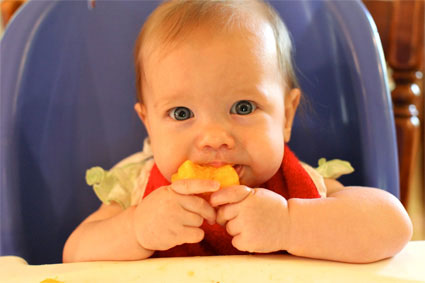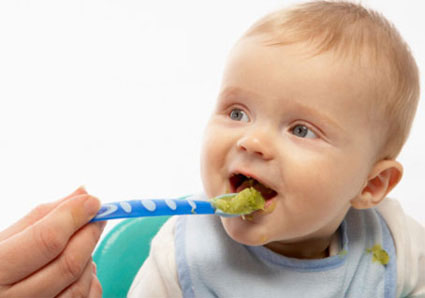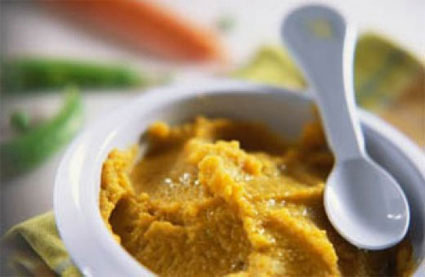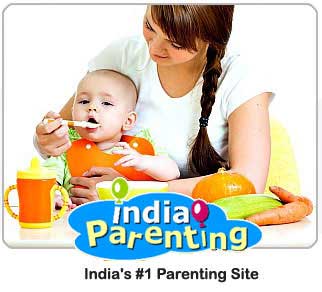Introducing fruits to babies in form of purees is an excellent way to include fruits in their diet. Here are some recipes for making fruit purees for babies at home.All paediatricians recommend fruit cooking before the fruit is pureed and fed to babies. With the exception of avocadoes and bananas you need to cook everything as the digestive system of babies are tender and underdeveloped. Ideally solids are introduced to babies when they are 6 months old. A baby who is older than 8 months can handle the complex sugars and fibres in fruits better.
Fruit Puree Recipes for Babies
Find recipes for making
fruit purees for babies right here.
Applesauce Puree
Only Rome apples and Mac Apples can be used for fruit puree as they are easily digestible. This puree is high in vitamin A and C and is a rich source of Potassium, Calcium and Magnesium. All you have to do is to peel and then core the apples before cutting them into slices. The slices will be submerged in a pan and then covered and steamed till tender. The apples should be mashed properly using a potato masher and then the mixture is thinned out using appropriate amount of filtered water.
Cereal is added to thicken the puree and if required a dash of cinnamon is added for better taste.
Banana Puree
Select only ripened bananas as they are sweeter and more easily digestible than greener ones. Like avocadoes bananas too do not need to be cooked. Simply peel and mash in the banana with a fork for 5 minutes. You can add some formula milk and cereal to give the banana puree a thick consistency. Heat the puree in a microwave for 20 seconds and cool before feeding. You can a few drops of lemon in the mixture to prevent browning.
Creamy Mango Puree
Mangoes are great source of vitamin A, Foliate, K, C and E and also have lots of minerals like magnesium, sodium and calcium in them. Mango puree can be made by adding plain yoghurt (small quantity) and pear juice to mango before mashing it into a large bowl. Mango puree should only be introduced at the age of 18 months and above and does not need to be cooked.
Avocado Puree
Most people are not aware that avocado is one of the most recommended fruits for small babies because of its natural softness and richness in minerals. Avocado puree is a rich source of Vitamin A, C and Niacin besides containing calcium, Phosphorus, magnesium, iron and other minerals in high quantities. Take one ripened avocado and remove the pits before taking out the flesh of the fruit and mashing it with a sharp fork. One good thing about avocadoes is that they do not need to be cooked and can easily be fed to babies. Make sure you only select dark green avocadoes with bumpy texture.
Butternut and Pear Puree
Butternuts are delicious and soft fleshy fruits that are an excellent source of vitamins and minerals. Here is how you can combine the sweetness of butternut with fresh taste of pears and make up a delicious puree. Peel one slice of butternut and core and shred one small pear to pieces. Put the mixture into a food processor and grind it into a thick creamy consistency. If your child is not allergic to honey then add a few drops of honey to enhance the taste of this fruit puree. However, honey is not recommended to babies who are under 12 months of age.
General Guidelines for Making Fruit Puree
Always use filtered water for making baby fruit puree and wait for 5 days to spot any
allergic reaction after you feed a specific fruit to your baby. Always wash and sterilise the instruments you use to
cook puree for your baby before use and take special care to keep those utensils separate.
Homemade fruit purees are an excellent source of vitamins and minerals so do not hesitate in trying out these amazing
recipes detailed above. Do consult a paediatrician before introducing these fruit purees to your baby.
When is the right time to introduce fruit purees to babies? How to introduce fruit purees to babies? What are the benefits of feeding fruit purees to babies? Discuss here. 






























